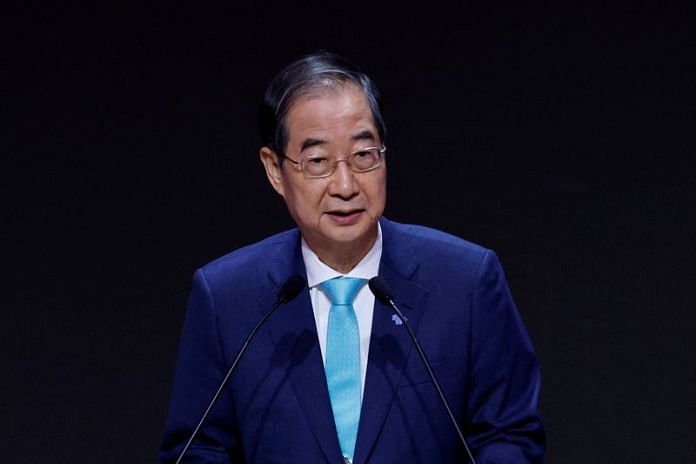By Joyce Lee
SEOUL (Reuters) -South Korea’s Constitutional Court ruled on Monday to strike down the impeachment of Prime Minister Han Duck-soo and restore his powers, marking the latest twist in the country’s political turmoil after his impeachment as acting president more than two months ago.
Han took over as acting leader from President Yoon Suk Yeol, who was himself impeached over his short-lived declaration of martial law last year.
Prime Minister Han lasted less than two weeks in the post and was impeached and suspended on December 27 after clashing with the opposition-led parliament by refusing to appoint three more justices to the Constitutional Court.
The justices on the court ruled seven to one to strike down the impeachment.
Han, 75, had served in leadership positions for more than three decades under five presidents, both conservative and liberal.
In a country sharply divided by partisan rhetoric, Han had been seen as a rare example of an official whose varied career transcended party lines.
Still, the opposition-led parliament accused him of not doing enough to thwart Yoon’s decision to declare martial law, an accusation he denied.
Finance Minister Choi Sang-mok assumed the position of acting president while the cases of Yoon and Han were considered by the Constitutional Court.
Parliament impeached Han over his alleged role in the martial law, as well as his refusal to appoint more justices to the Constitutional Court and back special counsel bills targetting Yoon and First Lady Kim Keon Hee.
Han attended the only hearing in the case on February 19, where he denied any role in the martial law episode and called for the court to dismiss the impeachment.
The unexpected imposition of martial law on December 3 by President Yoon and the ensuing political upheaval sent shockwaves through Asia’s fourth-largest economy, and drew concerns from allies such as the United States who had seen Yoon as a key partner in efforts to counter China and North Korea.
The martial law in the end only lasted about six hours after lawmakers voted to reject the declaration, after defying efforts by police and the military to seal off parliament, hopping fences to avoid the security cordons.
(Reporting by Joyce Lee and Jack Kim; Editing by Ed Davies)
Disclaimer: This report is auto generated from the Reuters news service. ThePrint holds no responsibility for its content.



